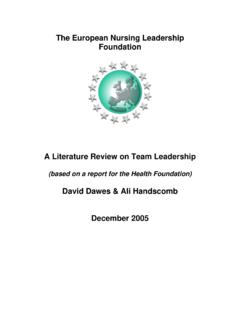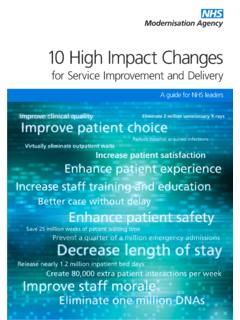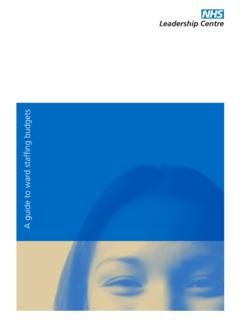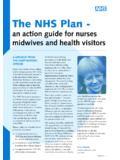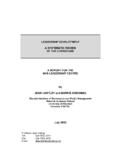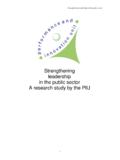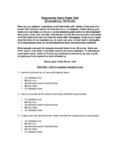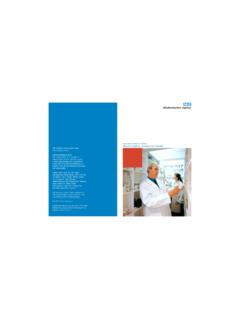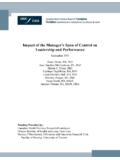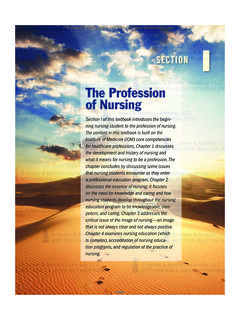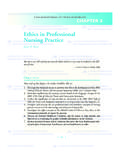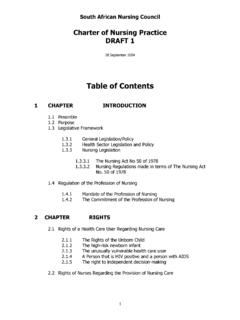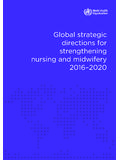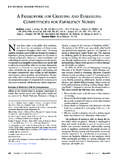Transcription of Modernising nursing careers setting the direction
1 Modernising nursing careerssetting the directionCover (Eng) 30/8/06 10:15 Page 3DH INFORMATION READER BOXP olicyEstatesHR / WorkforcePerformanceManagementIM & TPlanningFinanceClinicalDocument PurposeFor InformationROCR Ref:Gateway Ref: 6950 TitleModernising nursing careers setting the DirectionAuthorDepartment of Health - CNO s Directorate Publication Date04 Sep 2006 Target AudiencePCT CEs, NHS Trusts CEs, SHA CEs, Foundation Trust CEs, Directors of nursing , PCT PEC Chairs, NHS Trust Board Chairs, Special HA CEs, Independent Sector Circulation ListPCT CEs, NHS Trusts CEs, SHA CEs, Foundation Trust CEs, Directors of nursing , PCT PEC Chairs, NHS Trust Board Chairs, Special HA CEs, Independent SectorDescriptionThis document sets the direction for modern nursing careers . It includes actions that are intended to prepare nursing for the future in the context ofthe government s reform programmeCross RefN/A Superceded DocsN/AAction RequiredN/ATimingN/AContact DetailsJanice SigsworthDeputy Chief nursing OfficerRoom 529, Department of HealthRichmond House, 79 WhitehallLondon SW1A 2NS020 7210 5253 For Recipient s UsePartnership WorkingCover (Eng) 30/8/06 10:15 Page 4 Modernising nursing careerssetting the directionThe purpose of this report3 From the Chief nursing context of nursing is care is will this mean for the way nurses work?
2 And nursing careers careers for modern nursing careers : priorities and actions17 Develop a competent and flexible nursing workforce18 Update career pathways and career choices19 Prepare nurses to lead in a changed health care system20 Modernise the image of nursing and nursing careers21 Annex 1 Membership of the Modernising nursing careers Board22 Bibliography23 Modernising nursing careers : setting the direction , 20062 Modernising nursing careers : setting the direction , 20063No one can doubt that health care services across the UnitedKingdom are going through a period of profound change. Morechange will be needed if we are to continue to provide a healthservice that is free according to need and that keeps the trust andsupport of the public. Wherever they work, nurses will be aware ofhow health care is changing and wondering what it all means fortheir four United Kingdom chief nursing officers established themodernising nursing careers initiative in 2005/6.
3 It forms part of anoverarching programme of work covering all the main health careprofessionals. A UK-wide group of nursing leaders formed theModernising nursing careers Board, chaired by Christine Beasley,Chief nursing Officer for England (See Annex 1 for membership).This report is the outcome of their discussions, a series of nationalstakeholder workshops, and the views of nursing colleagues from allparts of the health services across the four countries and includingthe independent sector. The report is for frontline nurses, nurseleaders, education and workforce planners, commissioners andemployers to use locally to develop nursing four countries will take forward the actions in this report tomodernise nursing career structures throughout the United report sets the direction for Modernising nursing careers . Thepriorities focus on the careers of registered nurses, but it is recognisedthat nurses do not work in isolation and nursing teams include morethan registered nurses.
4 nursing careers also need to take account ofchanges in the careers of other professional groups. Importantly, thisreport recognises that careers take different forms: while some willchoose to climb an upward ladder of increasing responsibility andhigher rewards, many other nurses choose a more lateral careerjourney, moving within and between care groups and settings. Ouractions are for all nurses no matter what the nature of their career. nursing careers must respond to the profound changes taking placein the structure of health care delivery and the need for nurses toexercise leadership to bring about change. We hope this report willopen the way for flexible, diverse and rewarding careers for report is only the beginning. More work will need to be done bymany stakeholders to take forward the priorities and actions set outat the end of this purpose of this reportAs the chief nurse for England, I amprivileged to meet andobserve nurses working in a wholerange of healthcare settings.
5 I amalways struck by how muchnursing has changed but at thesame time how little. There havebeen medical advances that wecould have hardly has changed radically interms of its roles andresponsibilities and how it isorganised. Society is also changing,meaning nurses are caring for olderpatients, who often need a higherlevel of care and support. Today people s health and recovery isaffected by a complex array of factors that bring added challenges. In spite of all this change, what patients want and need from nurseshas changed very little. Patients want their contact with nurses tomake them feel safe, cared for, respected and involved. They want toknow that the nurse is there unconditionally for them, especiallywhen faced with fear, pain or loss. They want to know that nurses actions will be in their best interests and will help them get better,keep well, live life to the full, or help towards a better death.
6 Thismay sound obvious, almost simple, after all it is what nursing is andhas always been about. However, I know that this is not theexperience of every patient and client and making sure it is, is farfrom simple. nursing may not always be easy to describe but patients know whenthey get good nursing , and when they do not. nursing requires ahigh level set of skills and understanding which, taken separately,may seem commonplace and undemanding, but combined as awhole is far more complex and powerful. nursing is more than thesum of its parts. Any health system needs nurses who areintellectually able and emotionally aware and who can combinetechnical clinical skills with a deep understanding and ability to care,as one human to another. This is a constant of nursing . It is the valuebase on which public trust rests and the profession is grounded. As aprofession it is our promise to from Christine Beasley,Chief nursing Officer, EnglandModernising nursing careers : setting the direction , 20064 Listening to patients and the public, I am aware that their trust innursing is conditional and has to be earned in every new contactbetween the nurse and the patient, client and family.
7 Whatever newroles and responsibilities nurses take on in the future, whoever theywork for and wherever they work the constants of nursing must bepreserved, supported and developed. We carry our values within usindependent of the setting or organisation in which we looking at nursing careers and what nursing is today I have alwayshad in mind the two objectives of providing direction for newcareers at the same time as keeping constant to the values ofnursing and what matters to the public. Whether we are on a ward,in a patient s home or a university, in out-patients or a surgery, weare all responsible for taking nursing forward whilst staying true tothe core 2006 Modernising nursing careers : setting the direction , 20065 Modernising nursing careers : setting the direction , 200661 nursing is changing almost as rapidly as the context in which itis practised.
8 As a dynamic profession, nursing is responsive andis adapting to meet the needs of patients and the public. Acrossthe United Kingdom nurses have taken on new roles, workacross boundaries, and are setting up new services to meetpatients needs. Now is the time to take stock, consider whatthese changes mean for nursing careers , and ensure that nursingis fit for the modern health care systems are facing major global andsocietal changes. A number of factors lie behind governmentpolicies to reform the way the health service works. lSociety in the UK today is more complex, giving rise togreater social, cultural, racial and geographical diversity. lThere are more people in the older age range so long termconditions are more prevalent. As a consequence demand forhealth and social care will continue to causes of morbidity and mortality such as heartdisease and some cancers can respond well to preventativemeasures, but these frequently require life style changeswhich can be hard to is not distributed equally and inequalities continue tobe a major challenge.
9 LThe working population is smaller so fewer people areavailable to enter the s expectations of health care are changing. They aremore knowledgeable and expect to be treated as partnersand equals, and to have choices and options available advances in technology mean more effectivetreatments as well as the ability to provide care in cost of new treatments and new information andcommunication technologies means a greater focus on valuefor context of nursing is changingThe number of people agedover 85 years is projectedto rise by nearly 75% by2025. Over 15 million people inthe UK currently have along term condition, and asthe number of older peopleis projected to increaseacross the UK by between18% and 23% so thisnumber will rates have doubledin the last 10 years andpotentially lead to a rise instrokes, heart attacks andType 2 diabetes. It is esti-mated that 1 in 4 peoplewill be obese by mortality rates varyfrom per 1000 livebirths in Eastleigh,Hampshire to per 1000live births in is still the singlegreatest cause of illnessand premature death in theUK, killing at least 86,500people a year and account-ing for a third of all cancersand a seventh of allcardiovascular changesModernising nursing careers : setting the direction , 200672 Health services in the UK are undergoing unprecedented reformbacked by massive extra investment.
10 This reform programme istransforming the way health care is reform programmes across the UK are: lputting the needs and preferences of patients, users and thepublic, rather than those of professionals, at the forefront ofdecisions about patterns of serviceslfocusing on integrated care based on individualised pathwaysacross local health economies and social carelenabling much more choice for individualslimproving the care of people with long term conditionsllaying greater emphasis on prevention, health promotion andsupporting self-care lmoving more care outside of acute hospitals into thecommunity and people s homes lproviding incentives for working in new ways. Health care ischanging Massive investment in reformThe NHS budget in England has doubled since 1997 and willhave trebled by 2008 when it reaches Northern Ireland there has been a 35% increase in healthand social care spending over the last three years, with being spent in the current Scotland the health care budget has increased by 76% since1999 to health and social services budget in Wales has doubled to billion since the UK these reforms are underpinned byconsultations that show what people are looking for from healthservices.
